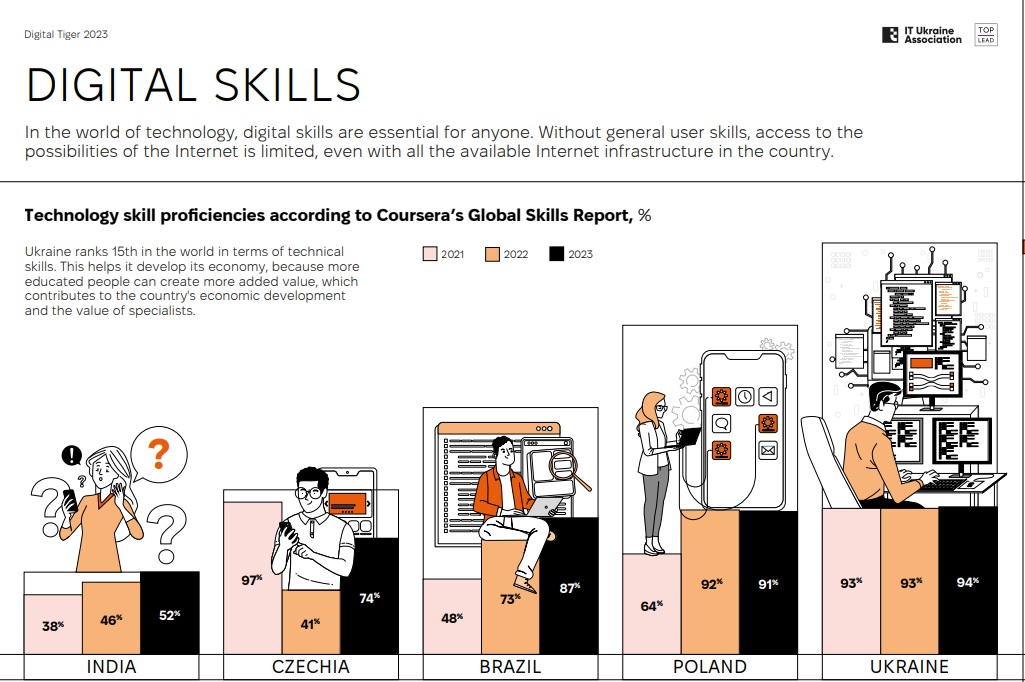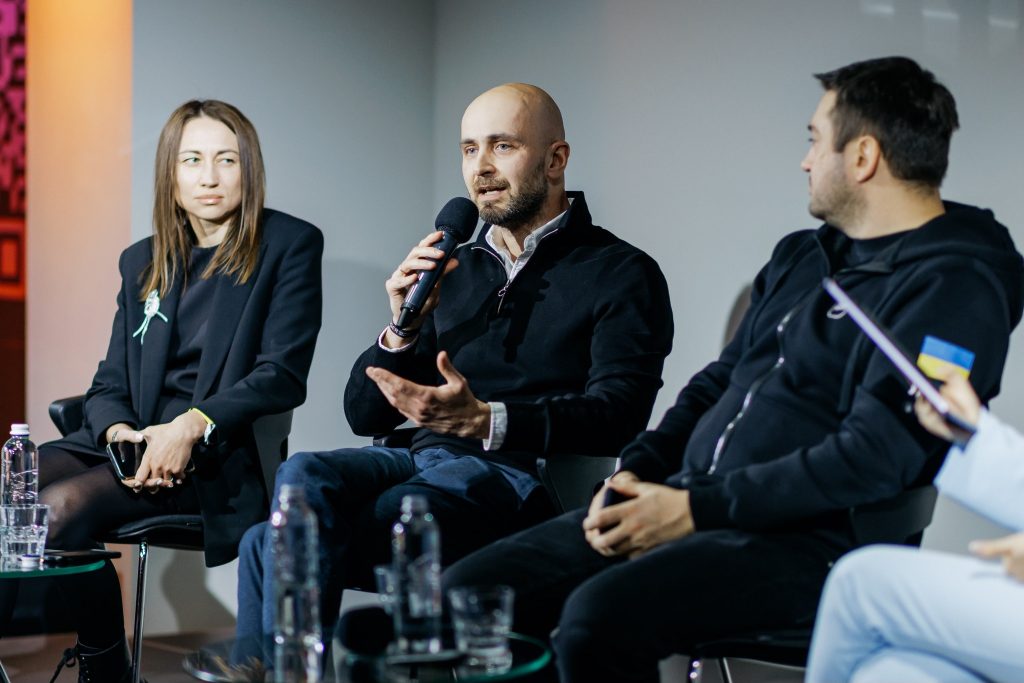«When our clients need to do something impossible, they come to Ukraine», says Stepan Mitish, Vice President, Head of EPAM Ukraine, during a panel discussion at presentations research Digital Tiger: the Power of Ukrainian IT – 2023. Mitish argues that as an employee of a global company with a presence in 55 countries, he has something to compare with: «Ukrainians are about creativity, knowledge, technology, and focus on results», he adds.
Stepan Mitish told MC.today journalist Dmytro Kruglikov what exactly are the «impossible» tasks Ukrainian IT professionals are doing better than others, and how copyright issues in the 90s helped the domestic IT industry to develop, and why artificial intelligence will not replace programmers.
Why Ukrainians’ digital skills are higher than in other countries
EPAM has large locations in many other countries, in particular in Europe – in Poland and Hungary, and in India, where it employs 7 thousand people, and in Latin America. However, the Ukrainian office is one of the largest, accounting for 1/5 of EPAM’s business.
«If we take the total, integral, qualitative characteristic, it turns out that the most difficult tasks, the most innovative, the ones that seem impossible to fulfill are given to Ukrainians», – states the head of EPAM Ukraine.
He has several explanations for this fact – although he clarifies that his opinion is subjective and «possibly biased». The first is the hard work of Ukrainians: «If in a European country a person comes at nine and leaves at five, Ukrainians will work more», – Mitish says.
The second is a high level of digital skills. He refers to data from the online education company Coursera, according to which Ukrainians ranked fifteenth in the global ranking of technical skills in 2023. According to this indicator, our compatriots are ahead of not only India and Brazil, but also the Czech Republic and Poland.

According to the head of EPAM Ukraine, the high technical skills of Ukrainians are due to both a good math and engineering school and natural curiosity, ambition, and «I’m sorry, that post-Soviet desire to prove that we are worth something». These factors have led to the creation of a very powerful IT community in Ukraine, the top manager is sure.
«Ukrainians mastered a lot of technologies when they were students. If you hadn’t read Design Patterns by gang of four, Martin Fowler’s Refactoring, or Kent Beck’s Extreme Programming, you were considered a bad programmer as a student», – recalls Mitish.
Another factor Mitish mentions is the weak copyright protection in the 90s.
The IT industry in Ukraine is now well established, but at the beginning of its formation, imperfections in the legislation gave future professionals an advantage.
«A client says: “I have a million, do it in six months”». What is the strength of Ukrainian IT people?
In support of his thesis that Ukrainians can do «the impossible», and that is why they are chosen to fulfill the most complex orders, Stepan Mitish explained the difference between the two engagement models. A typical model, Time and materials, involves paying a client per hour of work – «I need a team of 20 people and I want to make a product with them». Under this model, most of the risks are borne by the client, says Mitish.
«And then there are projects where a conditional client says I have a million and I need to make a certain product in six months. And these are usually very difficult projects, because you need to work as efficiently as possible, not wait for the next task, but plan a few steps ahead and understand the “critical path,” manage risks properly, cut out the unnecessary, and have difficult negotiations with clients. Because in such projects, as a rule, the client wants a Ferrari for a Fiat budget. And these are the projects that are usually given to Ukraine», – explained the head of EPAM Ukraine.
«But we understand that artificial intelligence will completely change human life. It’s still hard to say how», – our interlocutor notes. But he adds that there are currently two fundamental changes related to AI:
- Generative AI has made it possible to communicate with computers in human language. «If earlier it was necessary to learn programming, now any person who has good problem-solving skills can write the code while communicating with Chat GPT», – the top manager thinks.
- Technology has gained tremendous computing power, which continues to grow rapidly and make it possible to do today what seemed impossible yesterday. «Thanks to this, it is already possible to create a conditional archive of the Internet or an archive of all open source code from all developers on the planet, make an LLM file of, for example, 500 TB in size, and make Prompt queries from it And in fact, billions of tasks that have ever been solved by developers in the form of code will be available to anyone», – Mitish explained.
According to him, EPAM invests heavily in AI in two different areas: internal development and a department that deals with accelerators and finding AI solutions for clients.
When asked whether EPAM plans to lay off employees and replace them with AI, Mitish said that it has no such plans at the moment. It is difficult to predict the longer-term future because «we do not know how AI will change our business». Nevertheless, the head of EPAM Ukraine expressed his belief that there will be no layoffs due to AI without creating new jobs.
«If 50-60 years ago, programmers used punch cards, then there was Assembler, C, C++, now they write in high-level languages like C#, TypeScript, Python, Java/ And tomorrow they will talk to some interface that will translate tasks into the same code», – says Mitish.
Author: journalist MC.today Dmitry Kruglikov.

